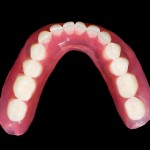
While rates of edentulousness are declining a substantive number of people still require treatment. Rehabilitation with implant overdentures (IODs) is a widely used treatment approach. Typically this involves the use of 2 dental implants although some consider 4 to be significantly better. The number of implants used has cost implications so the use of single implants has also been reported.
The aim of this review was to compare the survival of 1- vs. 2-implant overdentures (IODs) in the edentulous mandible.
Methods
Searches were conducted in the PubMed, Embase and CENTRAL databases. Randomised controlled trials (RCTs), prospective cohort studies, case-control studies, and prospective case series in the English language were considered. Two reviewers independently selected articles and abstracted data and risk of bias was assessed with the Cochrane risk of bias tool for RCTs and the Newcastle–Ottawa scales (NOS) for cohort and case-control studies. The primary outcome was post-loading implant survival rates.
Results
- 30 studies were included (2 RCTs; 28 prospective studies)
- Both RCTs were considered to be at low risk of bias.
- The overall random effects model did not reveal a significant risk difference (RD) for implant failure between the two interventions RD=0.05, (95% CI: -0.07, 0.18; I2 = 36.6%, P = 0.209;).
- One RCT favoured 1-implant (RD=0.08, 95% CI: 0.01, 0.14) the other favoured 2-implants (RD:-0.04, 95% CI: -0.27, 0.19)
Conclusions
The authors concluded
The results of this meta-analysis conclude that the postloading implant survival of 1-IODs is not significantly different from 2-IODs. However, the existing scientific evidence in the literature in terms of prospective comparative studies is scarce. Hence, before recommending the 1-IOD as a treatment modality, long-term observations are needed and a larger range of functional, prosthodontic, and patient-centered outcome measures should be considered.
Commentary
The authors only identified two randomised controlled trials that address this question. Both of the studies are small and together only involve 122 patients. Consequently the evidence to assess whether one or two dental implants are required to support mandibular overdentures is very low and larger well-conducted randomised controlled trials are needed.
Links
Srinivasan M, Makarov NA, Herrmann FR, Müller F. Implant survival in 1- versus 2-implant mandibular overdentures: a systematic review and meta-analysis. Clin Oral Implants Res. 2014 Oct 28. doi: 10.1111/clr.12513. [Epub ahead of print] PubMed PMID: 25350235.

[…] Dental Elf – 9th Dec 2014 – Overdentures: scarce evidence to assess 1- versus 2 dental i… […]